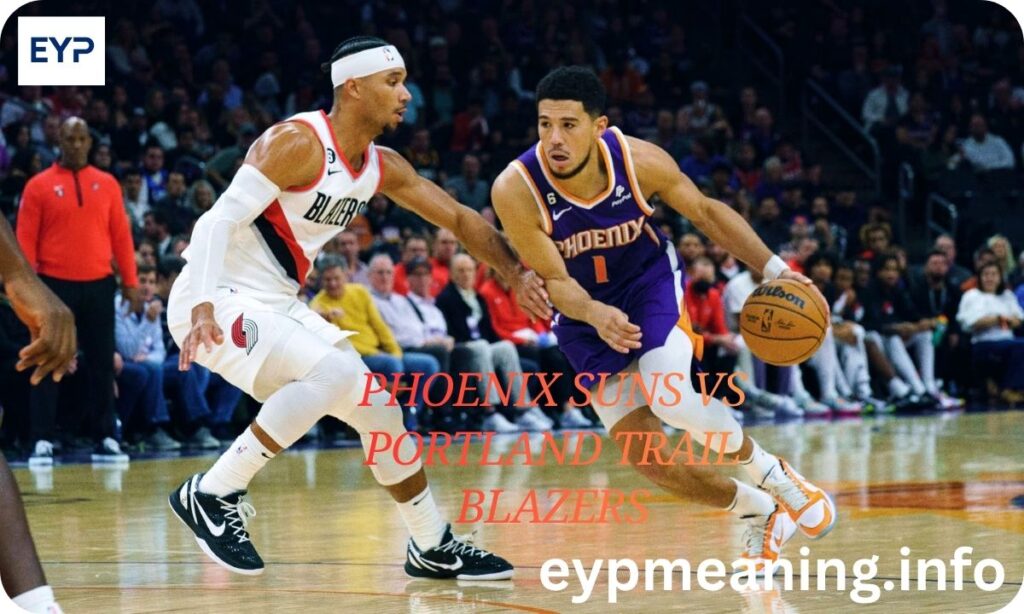The Phoenix Suns and Portland Trail Blazers delivered two unforgettable basketball games that captivated fans across the NBA. These back-to-back matchups showcased incredible individual performances, dramatic momentum shifts, and a compelling narrative centered around Deandre Ayton facing his former team.
Both games demonstrated the competitive spirit of professional basketball while highlighting the strengths and weaknesses of each franchise as they navigate through the 2024-2025 season.
Game 1: Blazers Win 127–108 (February 2, 2025)
The opening contest between these Western Conference rivals took place at the Moda Center in Portland, where the home team secured a decisive 127-108 victory. From the opening tip-off, the Trail Blazers established their dominance, executing their game plan with precision and overwhelming the Suns with their balanced attack and defensive intensity.
First Half Action
Portland came out with tremendous energy and purpose in the first quarter. Their defensive scheme effectively neutralized the Suns’ offensive threats, forcing Phoenix into uncomfortable situations and contested shots. Anfernee Simons orchestrated the offense beautifully, pushing the tempo at every opportunity and creating open looks for his teammates. His chemistry with rookie sensation Scoot Henderson was evident as they worked together to break down Phoenix’s defense.
The Blazers’ transition game was particularly effective during this stretch. They converted defensive stops into quick scoring opportunities, often catching the Suns’ defense before it could set up properly. Deandre Ayton, facing his former team for the first time since his trade, played with noticeable emotion and determination. He established himself in the paint early, using his size and strength to dominate the interior on both ends of the floor.
By halftime, Portland had built a commanding 61-46 advantage. The Suns appeared disjointed and struggled to find any offensive rhythm against Portland’s active defense. Phoenix’s perimeter shooters couldn’t find their range, and their lack of ball movement resulted in stagnant possessions. The 15-point halftime deficit reflected the Suns’ inability to match Portland’s intensity and execution.
Deandre Ayton’s Big Night
The storyline that dominated this game was undoubtedly Deandre Ayton’s performance against the Phoenix Suns, the team that drafted him first overall in 2018. Ayton approached this matchup with extra motivation, and it showed in every aspect of his play. He finished the night with an impressive 24 points on an incredibly efficient 11-of-12 shooting from the field, demonstrating the soft touch and finishing ability that made him such a highly-touted prospect.
Beyond his scoring, Ayton’s rebounding and defensive presence changed the complexion of the game. He controlled the paint, contested shots at the rim, and grabbed crucial rebounds that prevented Phoenix from generating second-chance opportunities. His pick-and-roll execution with Simons and Henderson was particularly effective, as he consistently rolled to the basket with perfect timing and finished through contact.
Suns’ Effort
Despite the disappointing result, the Phoenix Suns received valiant efforts from their superstar duo. Devin Booker, one of the league’s premier scorers, poured in 28 points while displaying his full offensive arsenal. He knocked down difficult mid-range jumpers, attacked the basket when driving lanes opened up, and tried to create opportunities for his teammates when the defense collapsed on him.
Kevin Durant added 25 points with his characteristic efficiency and scoring versatility. The future Hall of Famer used his length and skill to score over Portland’s defenders, hitting contested jumpers and finishing around the rim with his excellent touch. However, even the combined brilliance of Booker and Durant couldn’t overcome Portland’s balanced attack and superior team play.
Team Stats Summary
The statistical comparison between the two teams revealed why Portland controlled the game:
Phoenix Suns:
- Field Goal Percentage: 46.8%
- Three-Point Percentage: 35.7%
- Total Rebounds: 41
- Assists: 23
- Turnovers: 15
Portland Trail Blazers:
- Field Goal Percentage: 51.2%
- Three-Point Percentage: 39.4%
- Total Rebounds: 45
- Assists: 27
- Turnovers: 10
Portland’s superior shooting percentages from both inside and beyond the arc proved crucial. They executed their offensive sets with better precision and made higher-quality shots throughout the contest. The Blazers also won the rebounding battle by four boards, giving them additional possession opportunities. Perhaps most importantly, Portland’s 27 assists compared to Phoenix’s 23 demonstrated their superior ball movement and team-oriented approach.
The turnover differential was equally significant. Phoenix’s 15 turnovers compared to Portland’s 10 resulted in extra possessions for the Blazers, who converted these mistakes into easy transition baskets. Portland’s bench advantage of 30 points to 18 showed their greater depth and ability to maintain their level of play when starters rested.
Game 2: Blazers Win 121–119 in Overtime (February 4, 2025)
Just two days after their convincing victory in Portland, the Trail Blazers traveled to Phoenix for an immediate rematch. This game proved to be dramatically different from the first encounter, featuring multiple lead changes, intense competitiveness, and ultimately requiring an extra period to determine the winner. The 121-119 overtime thriller showcased both teams at their best and provided fans with entertainment from start to finish.
First Half: Suns Start Strong
Playing in front of their home crowd at the Footprint Center, the Phoenix Suns came out with noticeably better energy and focus than they had displayed in Game 1. The team’s ball movement improved significantly, with players making the extra pass to find open shooters rather than settling for contested attempts.
Devin Booker was absolutely spectacular in the first half, putting on a scoring clinic that reminded everyone why he’s considered one of the NBA’s elite offensive players. He scored 20 points before halftime, utilizing his complete offensive skillset. Booker hit pull-up jumpers off the dribble, created space for three-pointers, and attacked the basket aggressively when defenders gave him driving lanes. His performance energized the crowd and his teammates.
During this first half, Booker achieved a remarkable personal milestone. He surpassed Alvan Adams to become the Phoenix Suns’ all-time leading scorer, cementing his legacy as one of the greatest players in franchise history. The arena erupted in celebration as the achievement was announced, and Booker acknowledged the crowd with visible emotion before quickly refocusing on the task at hand.
Second Half and Overtime Drama
The second half featured the kind of back-and-forth action that makes professional basketball so compelling. Neither team could establish a comfortable lead as the momentum swung continuously. Every time one team appeared ready to take control, the other responded with a crucial basket or defensive stop.
Jerami Grant emerged as a key contributor for Portland during this stretch. The veteran forward knocked down several important three-pointers that kept the Blazers in contention when Phoenix threatened to pull away. His ability to create his own shot and hit contested jumpers proved invaluable during critical possessions.
Scoot Henderson, Portland’s talented young point guard, displayed maturity beyond his years in pressure situations. He made smart decisions with the ball, attacked the basket when opportunities arose, and didn’t shy away from big moments despite his rookie status. His fearlessness and confidence gave Portland an additional offensive weapon.
Booker’s Leadership
Despite his team falling short, Devin Booker’s performance deserves recognition as one of the best individual efforts of the season. He led all scorers with 34 points, constantly creating offense when Phoenix needed it most. Booker carried a tremendous offensive burden, taking and making difficult shots while also trying to facilitate for his teammates.
Kevin Durant complemented Booker with 26 points, using his seven-foot frame and exceptional skill to score over Portland’s defenders. Durant’s mid-range game remained deadly, and his experience showed in several crucial possessions. Bradley Beal, the third member of Phoenix’s star trio, contributed 17 points and provided secondary playmaking.
However, despite the strong performances from their big three, the Suns couldn’t close out the victory. They missed several crucial free throws and shot attempts in the final minutes of regulation and overtime that could have changed the outcome. These missed opportunities proved costly against a determined Portland team that refused to quit.
Team Stats Comparison
The statistical breakdown for Game 2 showed how evenly matched the teams were:
Phoenix Suns:
- Field Goal Percentage: 47.1%
- Three-Point Percentage: 35.7%
- Total Rebounds: 43
- Assists: 25
- Free Throws Made/Attempted: 15/18
Portland Trail Blazers:
- Field Goal Percentage: 44.9%
- Three-Point Percentage: 40.0%
- Total Rebounds: 49
- Assists: 28
- Free Throws Made/Attempted: 19/22
Portland’s dominance on the glass proved decisive. Their six-rebound advantage gave them extra possession opportunities that translated into crucial second-chance points. The Blazers’ superior three-point shooting percentage of 40% compared to Phoenix’s 35.7% also made a significant difference in a game decided by just two points.
Portland’s team basketball was reflected in their 28 assists, three more than Phoenix’s 25. This ball movement created better shot quality and kept the Suns’ defense constantly rotating and scrambling. Additionally, Portland’s better free-throw shooting (19-of-22 versus 15-of-18) proved important in such a closely contested game where every point mattered.
Key Player Highlights
Deandre Ayton (Trail Blazers)
Deandre Ayton’s performances across both games against his former team were nothing short of sensational. The former number-one overall pick combined for 49 points and 29 rebounds over the two contests, shooting an incredible 70% from the field. These weren’t just good numbers—they represented complete, dominant performances that impacted every aspect of the games.
In Game 2, Ayton recorded a 25-point, 20-rebound double-double that showcased his complete skillset. He protected the rim defensively, set solid screens that created open looks for teammates, and finished strong around the basket when he received the ball. His rebounding prowess gave Portland extra possessions and limited Phoenix’s second-chance opportunities.
Many observers described these games as Ayton’s “revenge tour” against the organization that traded him. However, Ayton handled the narrative with professionalism and maturity, focusing on team success rather than personal satisfaction. His comments after the games emphasized his commitment to Portland and his desire to help his new team win, showing growth not just as a player but as a leader.
Devin Booker (Suns)
Devin Booker’s performances reinforced his status as one of the NBA’s premier scorers and the heart of the Phoenix Suns franchise. His 34-point masterpiece in Game 2 wasn’t just another impressive scoring night—it was a historic achievement that saw him become the franchise’s all-time leading scorer.
Booker’s consistency and reliability in both games demonstrated his superstar credentials. Even when shots weren’t falling, he continued to attack and create opportunities. His ability to score from all three levels—beyond the arc, in the mid-range, and at the rim—makes him incredibly difficult to defend. Despite the losses, Booker showed why Phoenix built their team around him.
The milestone of becoming the Suns’ all-time leading scorer carries enormous significance. Booker surpassed Suns legends and established himself as the greatest scorer in the franchise’s storied history. This achievement cements his legacy in Phoenix and demonstrates his sustained excellence over multiple seasons.
Anfernee Simons (Trail Blazers)
Anfernee Simons emerged as a crucial complementary player to Ayton throughout both contests. He averaged over 20 points and 7 assists across the two games, providing Portland with consistent perimeter scoring and playmaking. His ability to shoot from deep stretched Phoenix’s defense and created driving lanes for teammates.
In Game 2, Simons’ 22 points and 8 assists were instrumental in Portland’s overtime victory. He hit several clutch three-pointers that kept the Blazers competitive when Phoenix threatened to pull away. His chemistry with Ayton in the pick-and-roll created numerous scoring opportunities for both players.
Simons’ leadership and confidence in crucial moments showed his development as a player. He didn’t shy away from big shots or important decisions with the ball. His willingness to take and make difficult shots gave Portland another reliable scoring option beyond Ayton.
Kevin Durant (Suns)
Kevin Durant’s consistency and reliability remained a constant for Phoenix throughout both games. He combined for 51 points across the two contests, maintaining his reputation as one of the most skilled and versatile scorers in NBA history. Durant’s length and shooting touch allow him to score over virtually any defender.
His mid-range game remains one of the most unstoppable weapons in basketball. Durant consistently hit contested jumpers from 15-20 feet, shots that most players can’t make with regularity. His offensive repertoire and basketball IQ kept Phoenix competitive even when other aspects of their game struggled.
However, even Durant’s excellence couldn’t overcome Portland’s balanced attack and superior team play. The games highlighted an ongoing challenge for Phoenix: their heavy reliance on individual brilliance rather than collective execution.
Team Takeaways
Phoenix Suns
These two losses exposed several concerning trends for the Phoenix Suns that they must address to achieve their championship aspirations. While their offensive firepower remains impressive thanks to their star trio, significant weaknesses threaten their long-term success.
Defensively, the Suns struggled mightily in both games. They couldn’t contain Portland’s pick-and-roll actions, particularly the Ayton-Simons combinations that repeatedly produced quality shots. Their perimeter defense allowed too many open three-pointers, and their interior defense couldn’t consistently stop Ayton’s dominance. These defensive breakdowns proved costly in close games.
The rebounding disparity between the teams revealed another area of concern. Portland out-rebounded Phoenix in both contests, creating additional possession opportunities that translated into crucial points. The Suns’ lack of size and physicality on the boards puts additional pressure on their offense to be nearly perfect.
Portland Trail Blazers
The Trail Blazers’ back-to-back victories over a talented Phoenix team provided encouraging evidence of their progress as a franchise. Portland entered this season in rebuilding mode, focusing on developing young talent while maintaining competitive standards. These wins demonstrated that their rebuild might progress faster than anticipated.
Deandre Ayton’s impact on Portland’s success cannot be overstated. Since joining the Blazers, he’s provided the interior presence and two-way ability they’ve lacked for years. His performance against Phoenix showed he can dominate against quality competition when motivated and confident. If he maintains this level of play, Portland suddenly has a legitimate building block for their future.
The emergence of young talents like Scoot Henderson gives Portland additional reasons for optimism. Henderson’s fearlessness and playmaking ability suggest he could develop into a cornerstone player. Combined with Simons’ proven scoring ability and leadership, Portland’s backcourt has significant potential.
Final Thoughts
These two matchups between the Phoenix Suns and Portland Trail Blazers provided everything basketball fans could want: individual brilliance, team drama, historical achievements, and competitive intensity. The games reminded viewers why the NBA captivates millions of fans worldwide.
Deandre Ayton’s dominant performances against his former team created a compelling narrative that added emotional weight to the contests. His professionalism and maturity in handling a potentially awkward situation earned respect throughout the basketball community. Rather than seeking personal revenge, he focused on team success and let his play speak for itself.
Frequently Asked Questions
Who scored the most points across both games?
Devin Booker led all scorers with 34 points in Game 2, though he also contributed 28 points in Game 1 for a two-game total of 62 points. His consistency and scoring ability kept Phoenix competitive despite the losses.
How many total points and rebounds did Deandre Ayton record in both games?
Ayton combined for 49 points (24 in Game 1, 25 in Game 2) and 29 rebounds across both contests. His shooting efficiency exceeded 70%, demonstrating his dominance against his former team.
Who won both matches between the Suns and Blazers?
The Portland Trail Blazers won both games—127-108 in the first game and 121-119 in overtime in the second game. These victories showcased Portland’s competitive improvement and balanced team play.
When did Devin Booker become the Suns’ all-time leading scorer?
Booker broke the franchise scoring record on February 4, 2025, during the overtime game in Phoenix. He surpassed Alvan Adams to claim the top spot in Suns history.
What was the final score of the first game?
Portland defeated Phoenix 127-108 in the first game played in Portland on February 2, 2025. The Blazers controlled the game throughout and never allowed the Suns to mount a serious comeback.






